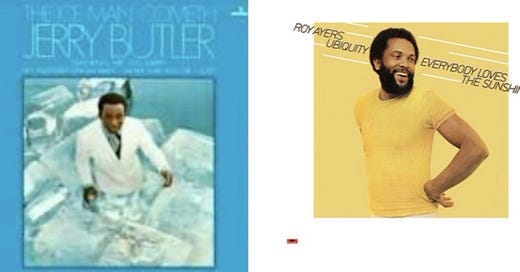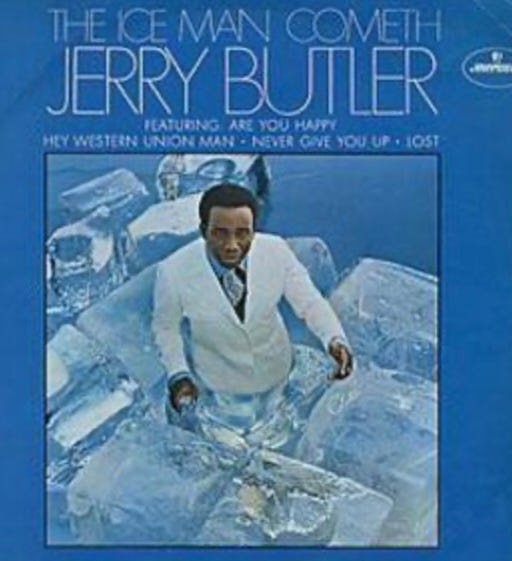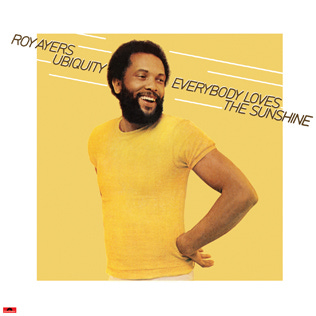There are many reasons for which to treasure the lives of legacies lost, and exponentially so when the passings occur closely together. And it is because of my elders that I came to appreciate and profoundly enjoy the music of both vocalist Jerry Butler and vibraphonist / multi-instrumentalist Roy Ayers.
For those who have been in the long struggle for justice, these two are among a legion of artists that signified cool and vital listening for the hip and conscious.. To my elders, these two brothers are among a glorious collective that has echoed in powerful ways the power of soul. In New York City, that has meant a history of singing and dancing together — Afro-American, Caribbean, Puerto Rican, and Cuban especially – as we built movements for healing and justice.
In the music of these two giants, love is the common denominator. Conscious tones flowed through the voice of Jerry Butler and the mallets of Roy Ayers. There was always a deeper message. There was a clear note when Butler sang of longing (“Hey, Western Union Man” [1968], which he co-wrote with the masters of Philadelphia soul, Kenneth Gamble and Leon Huff) or heartbreak followed by reassurance only a mother can give (“Only the Strong Survive” [1969]). You hear the same clarity when Ayers played and sang on two attention-commanding classics of 70s R&B: “Running Away” (1979) and, amid everyday struggles, personal and political, we just needed a moment to be grateful (“Everybody Loves the Sunshine” [1976]).
The minor-key piano/drum intro to “Hey, Western Union Man” awakens the senses before Butler makes his heartfelt request to the title subject. Think about it: a courier, a worker as the subject of the song. The pathos is palpable as the former lead singer of the Impressions belts the lyrics. He follows that with a unity of words and rhythm that is perfection:
Send a telegram, send a telegram, oh
Send a telegram to my baby
“A telegram?” you might ask.
And if the telegram don't do
Send a box of candy too and
Maybe some flowers
Tell her that I missed her for hours and hours
Send a telegram, send a telegram (Hurry up)
Send a telegram, man, to my baby
Do you hear what I say?
Yeah, brother, and it’s awesome to say those three words twice!
In contrast, “Only the Strong Survive” is on a vibe of affirmation that proves Mama gives the best advice. And the Ice Man1 himself delivers it best.
From the gospel, doo-wop, and Chicago soul of Butler, let’s commemorate the post-bop, jazz-funk, and California soul of Roy Ayers.
“Running Away” is on a beat as fast as the title, starting from the drum opening on the downbeat. The lyrics are a dialogue on the immense hurt that causes a breakup and the painful exchange as it is happening, ending in
Running, running, running far away.
Be sure to listen to the long version to know one undisputed truth: vibraphonists rock!
“Everybody Loves the Sunshine” is upbeat over an understated beat. Credited to one of the most fascinating band names incorporating the leader’s name - Roy Ayers Ubiquity - the drone-synth-laden ballad is a celebration of life through tight vocal harmonies interspersed with staccato piano notes like I never heard before or since.
Lyrics are repeated to warm effect, including this pointed reminder:
Folks get brown in the sunshine.
Ayers was remarkably prescient in emphasizing bees as central to life. After all, it’s
Just bees and things and flowers.
I write about Butler and Ayers together for one principal reason. I have seen both of them in concert at the same venue! Wingate Field in Brooklyn, New York, the athletic area for George Wingate High School, was for decades on Summer Monday nights the home for the legendary Martin Luther King Jr. Concert Series. Every season of this jewel of free concerts featured at least one night of classic soul. A group of us joined the cheering standing-room-only crowds on two shows to hear each of them.
The first of these featured Ayers on a bill with 80s soul staple Stephanie Mills on 23 July 2001. I was standing with a clear view of him close to the stage on his left. What was amazing was that while I could see the Funkmaster hitting it with those mallets, I couldn’t see what he struck inside that rectangular box. It would be years before I realized that he was playing a sonorous mallet synth.
We saw Butler on 20 July 2009. He was part of a massive nostalgia night, featured alongside long-time concert favorites The O'Jays, The New Stylistics Featuring Russell Thompkins Jr., and Harold Melvin's Bluenotes. Think about who co-wrote “Western Union Man” and you realize that this was Philly soul night. The audience eagerly awaited the Iceman and the opening riff to that signature song. This time, we had a relatively good view of him from the rear of the field.
These were all reminders of how we need to take care of each other with great sounds. Also, to give a shout-out to The O’Jays, there is a message in the music. To speak of messages, let’s send some! Hey, “send a telegram” (it’s possible) or, their present-day successors in brevity, an email or text message.
Listen to what Mama reminded us: “Only the strong survive.” Sometimes for our lives we have to “dippy-do, run, run, run.” And always “love the sunshine.”
Jerry Butler, Jr. (8 December 1939 – 20 February 2025)
Roy Edward Ayers, Jr. (10 September 1940 – 4 March 2025)
To Two Masters: Rest in Music!
buymeacoffee.com/martinezal
“Western Union Man” is on the album The Ice Man Cometh, and so from Eugene O’Neill’s play Butler received his nickname.





It's so great to read the joy in your reminiscences about the concerts at Wingate Field. Great memories, and how amazing - and sad of course - that they passed within 2 weeks of each other. Thanks for another great and informative read!